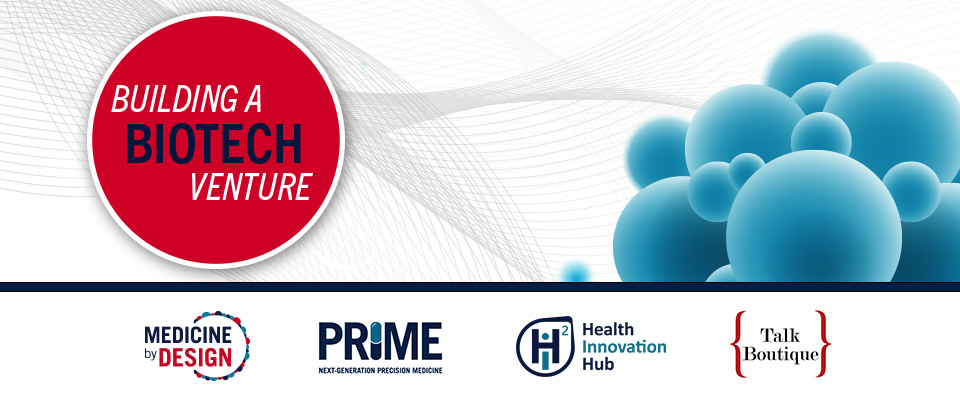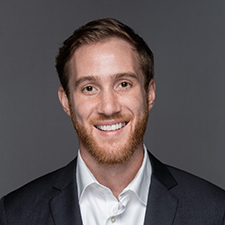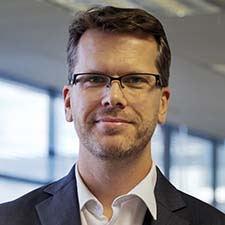
Join us in-person for the Building a Biotech Venture Pitch Competition to learn how the next generation of regenerative and precision medicine researchers are preparing to translate their discoveries toward impact.
Watch as six trainee-led teams from the University of Toronto and its affiliated hospitals pitch their ventures to an expert panel of judges. The winning team will receive $25,000, and the second-place team will receive $10,000 in research funding to advance their product concept.
The competition is the culmination of Medicine by Design’s Building a Biotech Venture program, offered in partnership with the Precision Medicine Initiative (PRiME), Health Innovation Hub (H2i) and Talk Boutique. Over the past several months, teams have worked with mentors to advance early-stage company concepts based on their research and have participated in a series of workshops to develop their business cases.
Come cheer on these up-and-coming entrepreneurs as they showcase their innovative technologies.
Location:
William Doo Auditorium
45 Willcocks St, Toronto, ON M5S 2H3
Meet the judges

Ella is an entrepreneur and business development executive for over 15 years. She has a strong track record of deals, working with companies such as IMV Inc., Nordion Inc, and Antibe Therapeutics Inc, driving fundraising and liquidity events. In roles of increasing responsibility, she has lead successful marketing and business development programs resulting in annual sales of over $50M. Ms. Korets-Smith has an M.Sc. in Medical Genetics from the University of Toronto and an M.B.A. from Dalhousie University.
 Mathew is an academic by training who received his PhD in Human Health from the University of Guelph in 2019. He launched his post-academic career in deep tech startups as a Health Venture Manager at the Creative Destruction Lab (CDL) in February of 2020. In his time at CDL-Toronto, Mathew reviewed over 500 health startup applications to the program, worked directly with 35 health ventures spanning devices to diagnostics to drug discovery/development, led their Health-Therapeutics stream in the fall of 2021 as a Senior Venture Manager, and helped launch CDL-Advanced Therapies and CDL-Biomedical Engineering in the spring of 2022 as Toronto’s Associate Director of Health Streams.
Mathew is an academic by training who received his PhD in Human Health from the University of Guelph in 2019. He launched his post-academic career in deep tech startups as a Health Venture Manager at the Creative Destruction Lab (CDL) in February of 2020. In his time at CDL-Toronto, Mathew reviewed over 500 health startup applications to the program, worked directly with 35 health ventures spanning devices to diagnostics to drug discovery/development, led their Health-Therapeutics stream in the fall of 2021 as a Senior Venture Manager, and helped launch CDL-Advanced Therapies and CDL-Biomedical Engineering in the spring of 2022 as Toronto’s Associate Director of Health Streams.
 Robin has over 20 years of experience working with regenerative medicine start-up companies. He started his career as an industry-trained pharmacist before moving into tissue engineering research. Robin joined CCRM to support the commercial development of early-stage ideas. He leads the team responsible for identifying and developing promising technologies and nurturing them to the company creation stage by strategically leveraging CCRM’s expertise and infrastructure.
Robin has over 20 years of experience working with regenerative medicine start-up companies. He started his career as an industry-trained pharmacist before moving into tissue engineering research. Robin joined CCRM to support the commercial development of early-stage ideas. He leads the team responsible for identifying and developing promising technologies and nurturing them to the company creation stage by strategically leveraging CCRM’s expertise and infrastructure.
 Suman joined Lumira in 2021 as an Associate and focuses on conducting scientific and technical diligence of investment opportunities. Prior to joining Lumira Ventures, Suman worked in healthcare consulting at L.E.K. Consulting in Boston as a Life Sciences Specialist. During her time at L.E.K., she provided strategic advice on growth opportunities, pipeline expansion, potential M&A partnerships and financial modeling. Before joining L.E.K., Suman spent 4 years doing a Postdoctoral Fellowship at Harvard Medical School and Dana Farber Cancer Institute. During this time, she worked with a multidisciplinary team to develop therapies to treat advanced cancers.
Suman joined Lumira in 2021 as an Associate and focuses on conducting scientific and technical diligence of investment opportunities. Prior to joining Lumira Ventures, Suman worked in healthcare consulting at L.E.K. Consulting in Boston as a Life Sciences Specialist. During her time at L.E.K., she provided strategic advice on growth opportunities, pipeline expansion, potential M&A partnerships and financial modeling. Before joining L.E.K., Suman spent 4 years doing a Postdoctoral Fellowship at Harvard Medical School and Dana Farber Cancer Institute. During this time, she worked with a multidisciplinary team to develop therapies to treat advanced cancers.
Meet the teams
CHI Diagnostics
The problem is inflammation.
At CHI Diagnostics, we have developed a blood test that can revolutionize post-transplant care by accurately detecting genetic markers associated with inflammation and identifying which patients are at risk of complications. This empowers us to offer personalized healthcare interventions, minimizing invasive tests for low-risk individuals and ensuring proactive measures for those at higher risk, ultimately optimizing post-transplant outcomes.
Team members: Tafsia Hussain, Filio Billia, John Dick, Sagi Abelson, Fernando Luis Scolari, Jessie Medeiros, Darshan H. Brahmbhatt, Gary Bader
Helixir
Enhancing the physicians’ MR eyes.
Helixir will use stem cell therapies to treat heart attack to demonstrate that regenerative therapies need the complement of our proprietary delivery technology to enable improved accuracy and increased therapeutic retention. This will then open the door for more minimally invasive regenerative therapies that require our pinpoint treatment delivery system.
Team members: Daniel Djayakarsana, Jaykumar Patel, Moses Cook
NorthMiRs, Inc.
Developing nanotechnology-enables gene therapies to address the underlying immune dysregulation of sepsis.
Sepsis is the most common cause of death in critically ill patients, doctors have to rely on supportive care for these patients as there are no specific treatments addressing the underlying immune dysregulation of the condition. NorthMiRs is changing this standard of care by developing a library of microRNA-based therapies that treats both systemic inflammation and organ-specific dysfunctions to ultimately improve patient outcomes, free up space in the ICU, and reduce the financial burden on the health system.
Team members: Samantha McWhirter, Logan Zettle, Chirag Vaswani, Amin Ektesabi
Re:Pair Genomics
Repairing the “cures”.
We’ve developed AI software to design compact GPS DNAs for gene therapy to make it safe and increase product success in the clinic. What traditionally takes scientists 3-6 months can now be generated within a day. Our innovation holds significant promise for biotech and pharmaceutical firms engaged in gene therapy research and development.
Team members: Luca Hategan, Yosuke Niibori, Shiron Lee, Swapna Prakash
Twenty-nine Therapeutics
Harnessing the power of the copper atom (element 29) to diagnose and treat metastatic disease.
Project Twenty Nine Therapeutics includes the exploration of a promising radiopharmaceutical candidate, Copper 67 (Cu-67), including its various nanomedicine applications. Cu-67 usage is novel and holds potential in theranostics and diagnostic imaging. The project Twenty Nine Therapeutics team is proposing a theranostic pairing of Copper 64 and Copper 67, making this the first combination of these two isotopes in a nanoparticle. The isotope also has unexplored promise in the treatment of various cancers, particularly those that have metastasized to the peritoneal lining. The team is exploring ways to firstly, manufacture and safely ship Cu-67 and secondly, examining its various therapeutic applications.
Team members: Michael Valic, Gang Zheng
Vrit
A macroporous collagen particle (MCP) based bioink and handheld bioprinter for treating full thickness skin defects.
At Vrit, we’re pioneering a future where autografts are no longer necessary for surgeries. Our handheld bioprinter, part of our broader biomaterials initiative, empowers surgeons to provide advanced care to patients by eliminating the reliance on traditional invasive techniques.
Team members: Sushant Singh, Zhenglin Lu, Michael Li Diao

